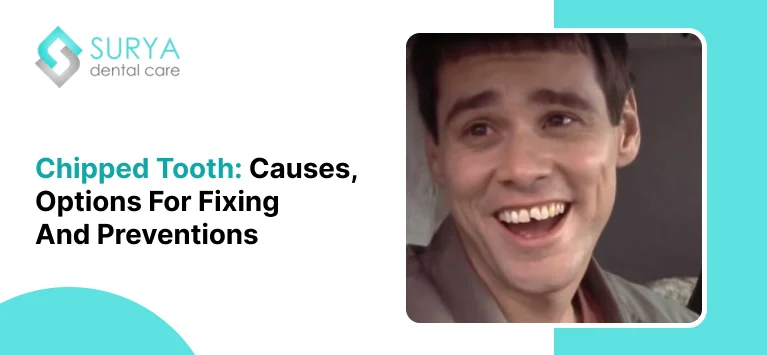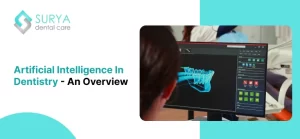A chipped tooth can hurt, and it happens when the tooth’s strongest outer layer, called enamel, breaks down. Trauma to the mouth and biting something hard are the major causes of chipped teeth. The seriousness of the chipped tooth may vary based on the size of the outer layer broken. A mildly broken outer layer tooth does not cause pain and discomfort. Meanwhile, if your tooth’s outer layer is broken by exposing the nerves of the teeth, then it could cause pain and discomfort.
Read the article to know more about chipped tooth its causes, what to do if you have a chipped tooth, and prevention methods.
Causes of a Chipped Tooth
Enamel may be the hard and strong substance in the body that covers our teeth. Though it breaks due to some causes, they are,
- Trauma to the Mouth: Physical injuries account for the major number of dental problems, such as chipped, broken, and cracked teeth. The study shows the importance of mouthguards in sports people, as most dental emergencies occur because most sports people do not wear a mouthguard.
- Biting Hard Objects: Hard foods like ice and nuts and hard candy significantly increase the risk.
- Tooth Decay: If you have weak teeth that already have cavities. Then, these teeth are more prone to fractures.
- Teeth Grinding (Bruxism): A 2022 study by the Sleep Foundation shows that up to 10% of the population grinds their teeth. This habit could weaken enamel over time.
- Sudden Temperature Changes: Rapid shifts between hot and cold foods can stress enamel.
Symptoms of Chipped Tooth
A chipped tooth might not always hurt because a mild chipped tooth cannot cause pain and discomfort. So knowing the signs of a chipped tooth could help you identify the chipped tooth. The signs are,
- Sharp edges or rough spots on the tooth.
- Sensitivity to hot and cold foods or sweets.
- Visible damage or missing parts of the tooth.
- Gums may appear swollen or tender around the chipped tooth.
How Serious Can a Chipped Tooth Get?
The severity of a chipped tooth varies based on the extent of damage,
- Minor Chips: Minor chipped teeth are often cosmetic and painless. They affect only a small portion of the enamel, but if ignored, minor chips may lead to further damage.
- Moderate Chips: Moderate chipped tooth further goes deep and damage until the dentin. Which makes the nerves of the teeth exposed and causes sensitivity. This needs to be taken care of immediately as nerves are exposed and could cause bacterial infections.
- Severe Chips: Severely chipped teeth may expose the pulp, and this could lead to pain, infection, or abscess formation.
Immediate Steps to Take
If you have a chipped tooth, then acting quickly is very important as a cracked tooth could cause a tooth infection, and a tooth infection could potentially lead to more dangers. Here are some immediate steps to take,
- To prevent the affected area from infection, you can rinse with warm water; it also helps clean the affected area.
- By applying a cold compress, you can reduce the swelling and discomfort.
- Use dental wax or sugar-free gum to cover sharp edges to avoid cuts.
- Visiting a Dentist and Professionally treating is crucial to assess and treat the damage.
Treatment Options for a Chipped Tooth
The severity of the chip determines the treatment of chipped teeth. The treatments are,
- Dental Bonding: It is Ideal for minor chips. A cosmetic procedure where a tooth-coloured resin is applied.
- Veneers: Used for moderate chips to restore aesthetics. This is used most widely for chips as it is effective.
- Crowns: crowns are used to protect and restore functionality where the teeth are severely damaged.
- Root Canal: It is recommended by the dentist only when the pulp or nerves are exposed.
Can a Chipped Tooth Heal on Its Own?
Enamel does not regenerate, so a chipped tooth cannot heal naturally. A professional dental intervention is essential to prevent further complications.
Preventing a Chipped Tooth
Prevention is key to maintaining healthy teeth. Here are some of the steps to prevent a chipped tooth,
- Avoid Hard Foods and Objects
- Wear a Mouthguard
- Maintain Oral Hygiene
- Regular Dental Check-ups:
- Be Mindful of Temperature Changes
When to See a Dentist for a Chipped Tooth
Consulting a dentist for a chipped tooth is recommended when you are having the following signs,
- Persistent pain or sensitivity.
- Swelling around the tooth.
- Visible cracks or jagged edges.
- Difficulty chewing or biting.
Takeaway
Chipped teeth require immediate professional treatment when they are causing pain, sensitivity, and discomfort, as the exposed nerves could cause an infection that could potentially lead to more health complications. Contact Surya Dental Care for treating chipped teeth with our expert cosmetic dental procedures.








Leave a Comment